|
Today on the Poetry SOUND Library we added the voice of Italian poet and writer Primo Levi. You can listen to his voice and beautiful words of hope in spite of the horror of the Holocaust in the button below.
We also would like to invite poets from all over the world to submit a poem about this sad moment of our history if they have recordings or poems to share. As always you can use the form to submit your poem. Finally we suggest you to read 55 poems as 19th Annual Yom HaShoah (Holocaust Remembrance Day) Poetry Issue G.I.
0 Comments
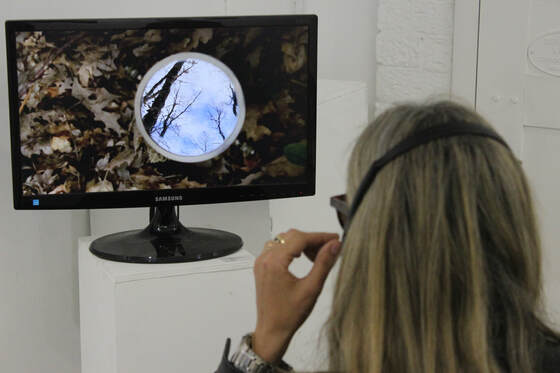 fRAMes by Giovanna Iorio fRAMes by Giovanna Iorio When a region is strange, a man explores it, comes to know its lengths and heights, its depths and riches and dangers. The time comes when he draws a map of it, not so much for later travelers in more of a hurry as for his own satisfaction in reducing time and space to the size of a sheet of paper. Sometimes this map is a novel, sometimes an essay, a building, a poem, or a portrait. Literature has been called an extension of experience, and few examples of graphic art so stretch and speed experience as a map. John Holmes, Map of My Country I just found this incredible article by Adele J. Haft that I find very interesting because it is about poets who write poems on maps. It is such a delightful article, and free! Résumé and the Article in pdf at the bottom of the page. This article offers a selection of notable American poems about maps and grapples with their place in a century unique for the number, range, and quality of such poems. Though others preceded her, Elizabeth Bishop takes center-stage for “The Map” (1934; Winslow, 1935, 78–79), which recognizes that poets and cartographers create selective, generalized, and simplified views of the world. As the opening poem of her Pulitzer Prize-winning collection (1955), “The Map” continues to inspire other poets to critique the map’s spatial representation in terms of physical geography and intimacy, time and scale, politics and race, as well as science, art, and exploration. “The Map” was soon followed by two influential but very different map-poems: “Cartography” by Louise Bogan (1938) and “Map of My Country” by John Holmes (1939: Part I). In his subsequent collection Map of My Country (1943: Parts I–XII), Holmes argued that a poem maps a person’s identity better than its graphic cousins do. Yet other poets found inspiration and an analogue of their experience in a particular map, cartographer, or painter of maps. Since the 1960s, visual poets have shaped poems into maps of American locales, thus complementing more “conventional” uses of maps to trigger poetic memoirs of place. The sexual revolution has popularized the body-as-map metaphor prominent in Bogan’s “Cartography.” Since 1980, map-fixated collections have been on the rise, encouraging poets of the twenty-first century to consider what maps say about place, culture, history, ourselves.
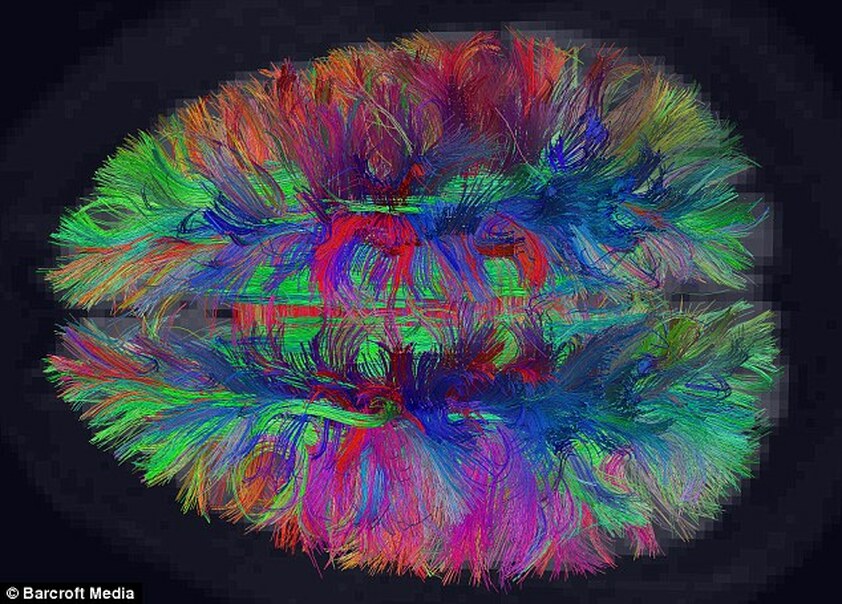 A map of the human brain showing the connecting nerve cells in our minds by Van Wedeen A map of the human brain showing the connecting nerve cells in our minds by Van Wedeen (A kind submission to POETRY SOUND LIBRARY Blog by Valentina Meloni, Italy - Italian translation available here) *** If we think about a map, unknown lands, boundless oceans and adventures come to mind. If we think about a map we can imagine travels, routes, explorations. If we use a map we can calculate latitudes and longitudes, distances, heights and depths. If we visualize a map we think about places and landscapes, people ... maybe not sounds. The sounds are part of the primordial word, the first intentional communication that contains gestures, mimicry, tone, emotion and intensity. And the voice is an identity, personal and unmistakable characteristic that gives a key to the text read, especially if the text or the poem in question is composed by the same author. Among the other functions of the poetry sound library exists an unseen beauty that should be perceived by everyone as a value: the map is moved by an aggregation engine ... Around an idea of a single poet, people have come together from all over the world to collaborate on a common project concerning Poetry. But the most important function I was speaking about is to clear the distances, although we have said that, usually, we use a map to calculate or highlight them. But if we do not think only in geographical terms, if we reason in terms of humanity, then the distances become thinner. And I'm not alone in thinking about it, at the time who said it with the mastery of always is one of the most important voices of Slavic literature and world poetry: Wislawa Szymborska, in the last poem she was working shortly before her death, at the age of 88 in 2012, entitled "Map" (Wislawa Szymborska, Map: Collected and Last Poems, Translated by Stanislaw Baranczak and Clare Cavanagh, Mariner Books, Reprint edition, 2016) Everything here is small, near, accessible. I can press volcanoes with my fingertip, stroke the poles without thick mittens, I can with a single glance encompass every desert with the river lying just beside it. Szymborska wrote so and today we can add that, with the tip of a finger, we can hear the voice of the poets, we can immerse ourselves in the poetry of the whole world, being in the same room with Allen Ginsberg, Boris Pasternak, Czeslaw Milosz, Giuseppe Ungaretti, Anna Akhmatova and even with Wisława Szymborska herself. Entering the map we find ourselves in a place where living and non-living poets of many nationalities coexist; from our home and, with mobile devices from every connected place, we can hear the voices of poets very distant from us in space and time. Not only that: the space between poets and people is abolished. The users of the map perceive poetry in a different way, more tangible, more human, more within their grasp. There is no more encumbrance of physical presence, poetry is voice and speaks with the poet's voice, not longer only with biography or with the importance of awards or labels, or with the rarefied distance of the paper. But with the emotion and the warmth of a voice with all its nuances and over-impressions to decipher, it is an evidence. How can one not perceive all this as something important that belongs to everyone? Then let us tune into the frequencies of poetry, albeit with the due differences, without obligations of frequentation between poets and poetic factions, between circles, groups and genres, tune in on a map that allows us to preserve the voice, return to the purity of sound, remove the noise from the words, awaken the primordial sound of the wind, give back to poetry the power of the voice. Because the voice is a cultural heritage to be preserved. Through the voice we transmit emotions and vibrations, vital elements for Poetry and for every type of communication. In the east and west, above and below the equator -- quiet like pins dropping, and in every black pinprick people keep on living. And in every seed of our poetic map also lives the voice of a poet, recovered, made his own, witnessed, and listened to. A voice that can bring out and highlight a little mystery, the secret that, according to Giuseppe Ungaretti, every true poem must possess ... And speaking of poetry and its incomprehensible secret but not only, because everything resounds with a distant music both in speaking and writing, Friedrich Nietzsche wrote: «What in language is better includes not the word, but the tone, the intensity, the modulation, the rhythm with which a series of words are spoken - in short, the music behind the words, the passion behind this music, the personality behind this passion: so all that can not be written.» And I find it is wonderful, as if there were a subtle watermark in everything stated and even sometimes in silence. The Poetry Sound Library is an active testimony of the recovery of orality in Poetry and of the oral function of Poetry with its enchanting power that generates wonder and emotions, because all that generates emotions is also able to create beauty. Szymborska concludes with an implicit suggestion: clearing borders. An utopia? Well, what else should poetry serve if not to generate utopias and the resulting ferment? Nations’ borders are barely visible as if they wavered—to be or not. I like maps, because they lie. Because they give no access to the vicious truth. Because great-heartedly, good-naturedly they spread before me a world not of this world. You know, it is not true, or it is not for everyone, that today the boundaries are more subtle and that we are free to express ourselves, so the testimony of the voice is important. The voice of poetry can highlight the singularities of peoples, preserve their uniqueness and, at the same time, enclose them in a protective skin of convergences and affinities, the peel of an ancient fruit. To be there or not to be there? It is no longer just the Shakespearian To Be or Not To Be, it is much more. Being in the world or not being there? Be part of a movement or want to disappear from the confines of the world and from every map? I chose to be there because I want to live in a world that is not made of this world and because I want to witness everything that can not be written, as the poet Ko Un writes: «No poetry can remain on a desk or on an internet screen. Poems don’t exist in material anthologies. The universe, the space, the immensity of time are their most appropriate stage. The text is but a small part of the poem and does not represent the whole « » (Ko Un, L'isola che canta, Lietocolle, 2009). And I too as the critic Song Min- Yop told about Ko Un I would like to breathe our poems before putting them on paper, imagining that they arise from an enchanting breath rather than from our pen, just like a living thing. Map, by Wisława Szymborska Flat as the table it’s placed on. Nothing moves beneath it and it seeks no outlet. Above—my human breath creates no stirring air and leaves its total surface undisturbed. Its plains, valleys are always green, uplands, mountains are yellow and brown, while seas, oceans remain a kindly blue beside the tattered shores. Everything here is small, near, accessible. I can press volcanoes with my fingertip, stroke the poles without thick mittens, I can with a single glance encompass every desert with the river lying just beside it. A few trees stand for ancient forests, you couldn’t lose your way among them. In the east and west, above and below the equator-- quiet like pins dropping, and in every black pinprick people keep on living. Mass graves and sudden ruins are out of the picture. Nations’ borders are barely visible as if they wavered—to be or not. I like maps, because they lie. Because they give no access to the vicious truth. Because great-heartedly, good-naturedly they spread before me a world not of this world. _ Translated, from the Polish, by Clare Cavanagh, NewYorker April, 14th, 2014 In Wislawa Szymborska, Map: Collected and Last Poems, Translated by Stanislaw Baranczak and Clare Cavanagh, Mariner Books, Reprint edition, 2016 An amazing book. Click to read 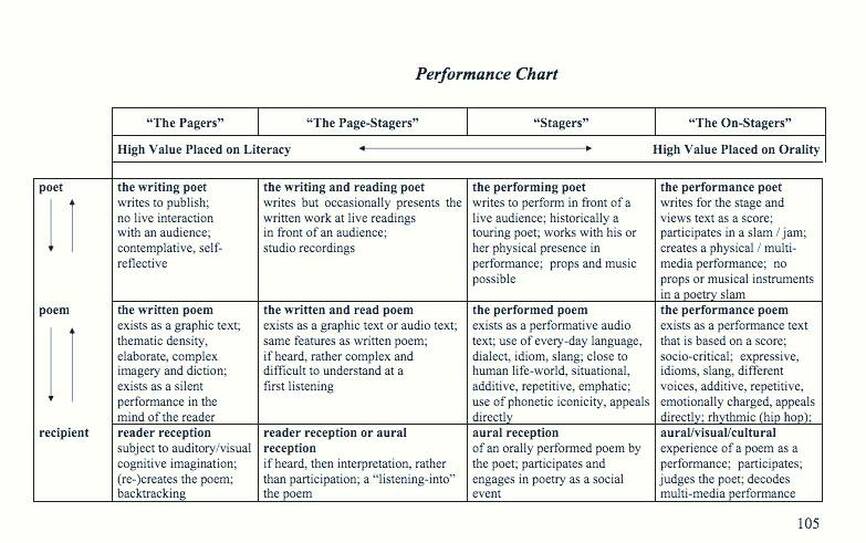 The Performance Chart explains the differences between The writing poet and the Performance poet (p. 105)
We can't stop listening to the wonderful voice of Pekko Käppi (Finland) singing a poem based on a version found in the Suomen Kansan Vanhat Runot (the Ancient Poems of the Finnish People anthology).
"It was sung by a person called ‘Tarin akka’ (Tari’s Hag). You can’t find the exact version from there though, because over the years the song has altered in people’s mouths. The storyline is the same however. It’s a very strange song, because the Creator,God and Mari get mixed up all the time. Oh yes, Mari is Saint Mary. I really like the story: there’s an element of ‘living death’ and this terrible feeling that there’s loads of people following right behind you, watching and commenting on what you are doing. But in the end no one has any idea of Mari’s mission. Also the aspect of a road and going down the road is always fascinating." Extracted from The World Record: International Voices from Poetry Parnassus We just added a fourth color to our map: an orange marker.
We discovered the wonderful Archive of Badilisha Poetry X-Change and we can't wait to share these wonderful poets' voices with you. This is what they do: "Badilisha Poetry X-Change has archived over 350 African poets from 22 different countries from both the continent and the global African Diaspora. Each week, two new poets are featured on the website and via podcasts. These poets represent a broad range of voices, genres and language, thereby reflecting contemporary trends and evolutions in the medium along with some of the historic giants of African poetry. Our extensive network of Pan-African poets and poetry organisations enables us to create much-needed exposure and viable opportunities for Africa’s poets. Badilisha Poetry is a project of the Africa Centre. The Africa Centre is a physical entity as well as an ongoing philosophical journey that explores how Pan-African cultural practice can be a catalyst for social change. The Africa Centre was established in 2005 as an international centre for creativity, artistic excellence and intellectual engagement. Based in Cape Town, South Africa, the Africa Centre’s social innovations extend across the African continent." And this is why they do it: "Africans have limited access to the vast poetic work of both historical and contemporary African poets. There has never been an archive of these poets’ work that is both expansive and easily accessible. This means that many Africans are not inspired and influenced by their own writers and poets – negatively impacting their personal growth, identity, development and sense of place. In comparison to their counterparts on other continents, African poets receive little exposure for their work and few viable career opportunities. Both factors are imperative to their development as artists. For instance, of all the published books in the world, the works of African authors comprise only two percent. This imbalance exists for a myriad of reasons, but can to a large extent be attributed to the reality that both within Africa and beyond, reading and listening to African voices is not prioritised." On the Poetry Sound Library we have uploaded the voice of: Mirna Kabwe , Mwila Mambwe, Letang Selepe and many more will be available soon (orange marker). Suggestion to users: if you wish to listen only to a category of poets just select one color and deselect All at the bottom of the page. Richard Eberhart
"Poetry is a maneuvering of ideas, a spectacular pleasure, achievement and mastery of intractable material, not less than an attempt to move the world, to order the chaos of man, insofar as one is able. Love, harmony, order; poise, precision, new worlds."
|
Giovanna IorioPoet, sound artist & Founder of the Poetry Sound Library. Archives
January 2020
Categories |
||||||


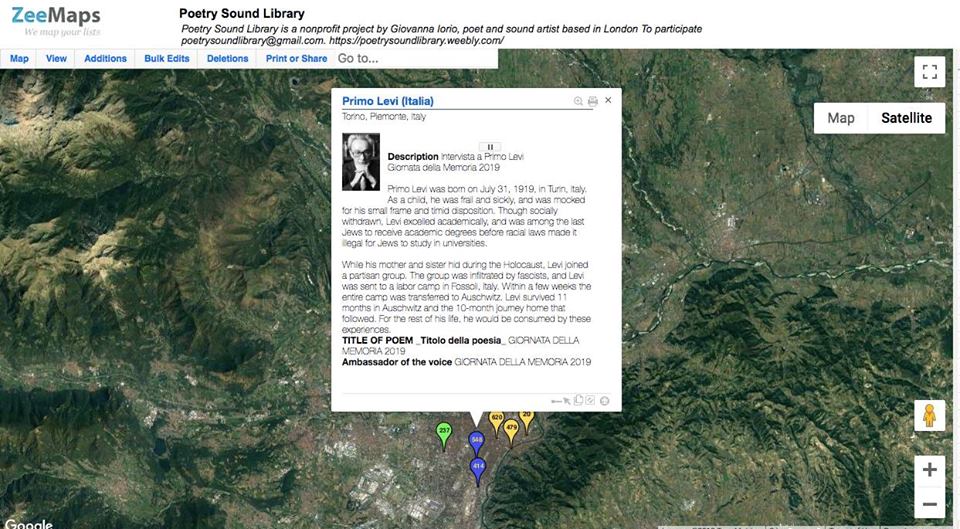
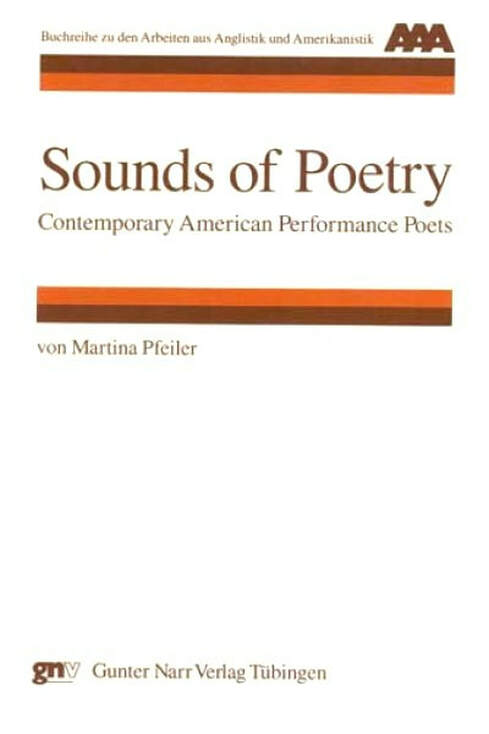
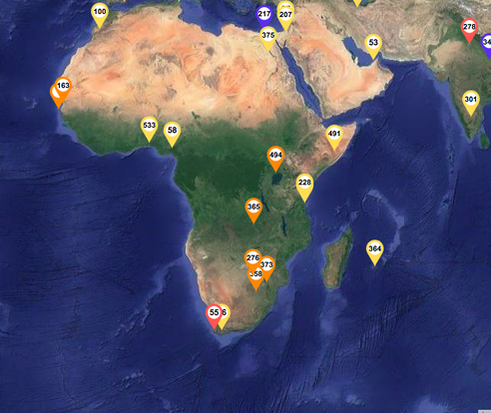
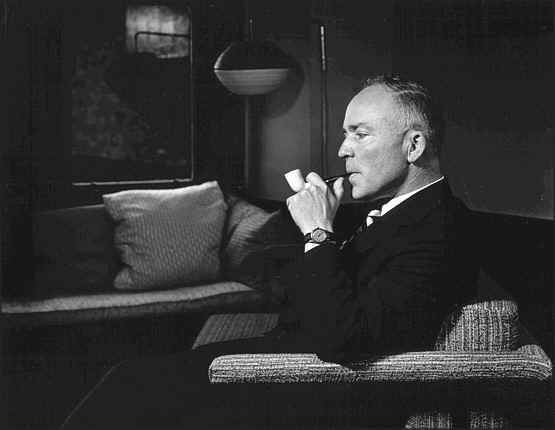
 RSS Feed
RSS Feed
